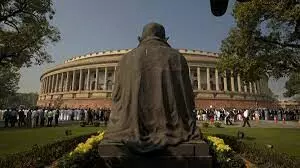
Parliament Ruckus: A democratic protest seen in undemocratic perspective
text_fieldsSince the beginning of the monsoon session of the parliament, what was in the display was not smooth going of the procedures in both houses over a number of issues, including the Pegasus snooping as the key subject for opposition parties to create a chaotic situation with an eagerness to know what was the role the government had played in employing the Israeli spyware company.
Many a time, the house had to witness the government passing bills without a discussion on them while the opposition parties cried foul and vowed not to permit debates unless and until the Chair allowed the houses to discuss Pegasus, arguing that in the absence of proper discussion they were no longer bound to adhere to the rules governing the Houses.
Both the houses of the Parliament were tumultuous during the sessions so that no concrete discussions over a number of issues happened as was the session ending Friday. Literally, the monsoon session was a waste of time and loss for the exchequer but at the same time, no matter what the numbers of the governing party in the houses were, the opposing members have a case to stall the Parliament if the government takes a stand of an autocratic rule in a democracy.
At one point, the session went awry pushing Rajya Sabha Chairman M Venkaiah Naidu into deep grief and emotion to plead with the opposition to keep the decorum. Expressing sadness over the opposition's behaviour was not new for Venkaiah Naidu, as a similar ruckus in the Parliament over the Rafale deal with the French government during the first Modi government had put Rajya Sabha Chairman into the same state.
The days before ending the session, the opposition party members could be seen gathering in the well, shouting, and tearing off some of the bill document whereupon the House marshal intervened at the command of the Chair, ensuing a scuffle and fisticuffs. That, however, did not end there. The consequences of the tussle the Honourable Members of the Parliament had with the marshals, has given both the government and the opposition the opportunity to put their cases before the public.
It is the non-cooperating, disruptive opposition wasting public money that the government had to highlight before the public, while the opposition found the entire affairs, from bottom to top of the government undemocratic that denied the very right of a citizen to know the government's affairs.
Though the monsoon session has ended in the manner, the waves it has created were expected to be strengthening in the coming days to smash the opposition with the reported mulling of actions against 'unruly' members in the Parliament by Rajya Sabha Chairman M Venkaiah.
Venkaiah Naidu is said to be seeking legal opinion with experts, including former and serving senior members of the Rajya Sabha secretariat to initiate action against some of the opposition members whose behaviour was allegedly found to be not up to the mark set in the rules.
It is still a conundrum for the Chairman as a unilateral pronouncement of actions against the selected members, defining their actions as non-parliamentary would further infuriate the opposition. Naidu is reported to be considering a panel to recommend actions against the members and the nature of the committee, i.e., whether it could be a panel on privileges, ethics and special parliamentary committee, including opposition party members.
However, the reports coming out clearly suggest that actions are inevitable against whom Naidu found errant members to uphold the sacredness of the Houses. The proposed committees, the Rajya Sabha chairman is likely to constitute to put the 'unruly' members actions into trial have certain key features.
The Committee of Privileges of Rajya Sabha can review whether the honourable members, the Council or a Committee thereof had breached the privilege and can recommend actions accordingly considering the extent of the breach, whereas a Committee on Ethics is entitled to look into "the moral and ethical conduct of the members and to examine the cases referred to it with reference to the ethical and other misconduct by members".
Another option for the Chairman is the setting up of a special committee, including the members of the opposition parties, to review the actions of the said members. The Lok Sabha had the precedent of creating such a committee during the first UPA government when late Somnath Chatterjee was the Lok Sabha Speaker. The committee had expelled 10 members of the opposition then for their indocile actions without taking the matter to the Privileges Committee.
Venkaiah Naidu reiterated time and again how he is committed to both sides calling the Opposition and Treasury benches as two eyes of his and equal before him and reminding the collective responsibility of both sides to ensure the smooth running of the sacred house of democracy. He said the legislature should be the tool for debate and discussion on the houses where the external political rivalry has no place.
But the Congress leader Mallikarjun Kharge, Leader of Opposition in Rajya Sabha is not in line with the Chairman in that he accused the government which did not allow the opposition to raise the relevant issues in Parliament. He said it was the government who disrupted the monsoon session by not considering the opposition's demand for a discussion on Pegasus, farmers agitation and the COVID situation in the country, through what he called the government derailment of the House proceedings.
After all, as ever, the monsoon Parliamentary session ended fruitlessly at the cost of citizens.























